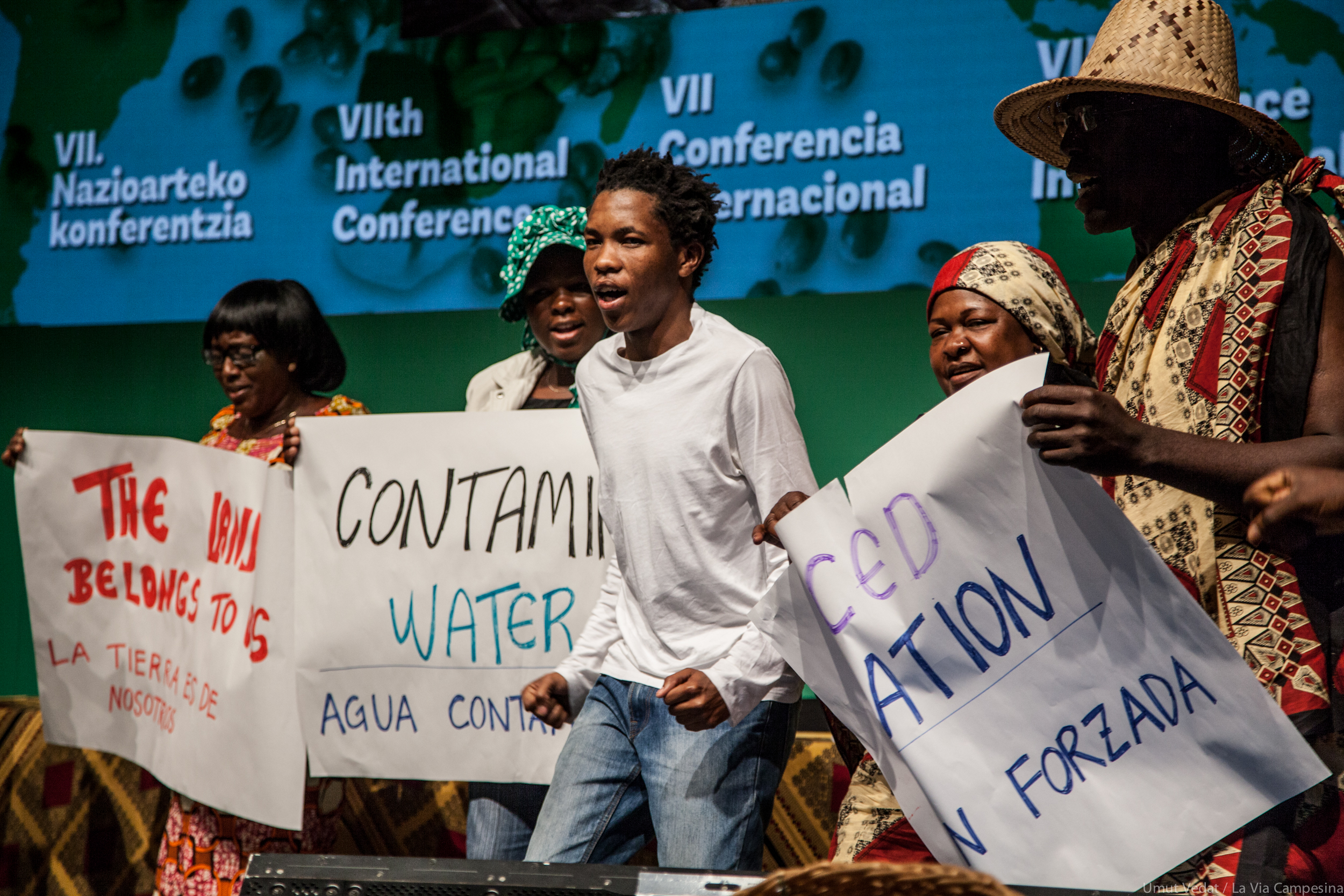Derio, Basque Country: “It is amazing to see how linked our struggles are”. With a countenance showing enthusiasm and eagerness, Nicolette Cupido could not conceal her emotions. There are two main reasons for her excitement. It is the first time she had attended a global conference of peasant´s movements like the one she is taking part since July 16 in Derio, in the outskirts of Bilbao, Basque Country and her movement, the Agrarian Reform for Food Sovereignty Campaign (FSC), South Africa, was among the new organisations accepted into membership of Via Campesina.
A community organiser and a member of the FSC Nicolette engages in food production at home and community gardens in Moorreesburg, a village in Western Cape, 120 Km away from Cape Town.
She grows a variety of vegetables -, that is the way she contributes in building food sovereignty. “I plant tomato, onions, beetroot, cabbage, and carrots. The struggle for food sovereignty has to be in practical too”, she said.
Like Nicolette, about 20 other African peasants representing movements from Mozambique, Zimbabwe, Niger, Mali, Senegal and Ghana are attending the conference.
This conference happens at a time when Africa is undergoing a harsh moment, as indicated by Ibrahima Coulibaly from the National Coordination of Peasant Organizations (CNOP) in Mali. Almost everywhere in Africa the elite and corporations are undertaking efforts to capture and control people’s basic means of production, such as land, mineral resources, seeds and water. Those resources are increasingly being privatized due to the myriad of investment agreements and policies driven by new institutional approaches, imposed on the continent by western powers and Bretton Woods institutions, namely IMF and the World Bank.
“Democracy is under attack. Repression to protest and murder of political leaders is escalating, but we have to continue to build alternatives”, said Coulibaly.
Elizabeth Mpofu, from the Zimbabwe Smallholder Farmer´s Forum (ZIMSOFF) is a small-scale farmer who had access to land after she took part in the radical land occupation that resulted in the fast track land reform in the early 2000s in Zimbabwe. According to her, building alternatives is to take direct action. “I was a landless woman. Through our courage and determination we stood up and took action. Now I have land and I do agroecology farming”, she said.
The relations between the state, corporate power and the peasantry have always been exploitative. This characterizes the agrarian question in Africa. As some academics have argued, these relations have been coercive.
The perception that Africa is a vast “underutilised” area and therefore available for large-scale agricultural investment, continues even today particularly among some western governments and foreign investors.
The African peasantry has, however, always resisted capital penetration in the countryside. “Africa has taught us many centuries of struggle and resistance”, remarked Eberto Diaz, peasant leader from Colombia during the opening session of the 7th Conference of La Via Campesina. Elizabeth Mpofu shares the same belief: “I think that our historical and present struggle experiences in Africa could inspire comrades from other countries”.
Domingos Buramo, from the Mozambique Peasants Union (UNAC) brings to the conference the experience of the Mozambican peasants and other civil society organizations against land grabbing and large-scale investment projects in Mozambique. He mentioned that the resistance to ProSavana, a large-scale agricultural project proposed for Mozambique, is an example of how transformative articulated struggles could be. “Now the government is changing its vision as a result of our work. We can change our societies”, he said.
In South Africa, landless black people are engaging in various forms of protest to access to land, water and natural resources. “We do various social actions such as protest marches, pickets, sit-ins and even land occupations”, said Tieho Mofokeng, from the Landless Peoples Movement (MLP), in Free State, South Africa.
Africa – including the Maghreb region – was the last continent to be part of La Via Campesina. Since 2004 the number of African peasant movements joining La Via Campesina has been increasing. African movements consider their membership to the peasant movement as a strategic process of amplifying their struggles and reinforce internationalism.
La Campesina International Conference is the highest and most significant decision-making space of the movement.
Peasants from Africa, members of @via_campesina open Day 2 of #7ConfLVC with mistica about #PeasantsRights: https://t.co/kQvvKVslys pic.twitter.com/s4yS6wYLSJ
— La Via Campesina (Official EN) (@via_campesina) July 20, 2017

